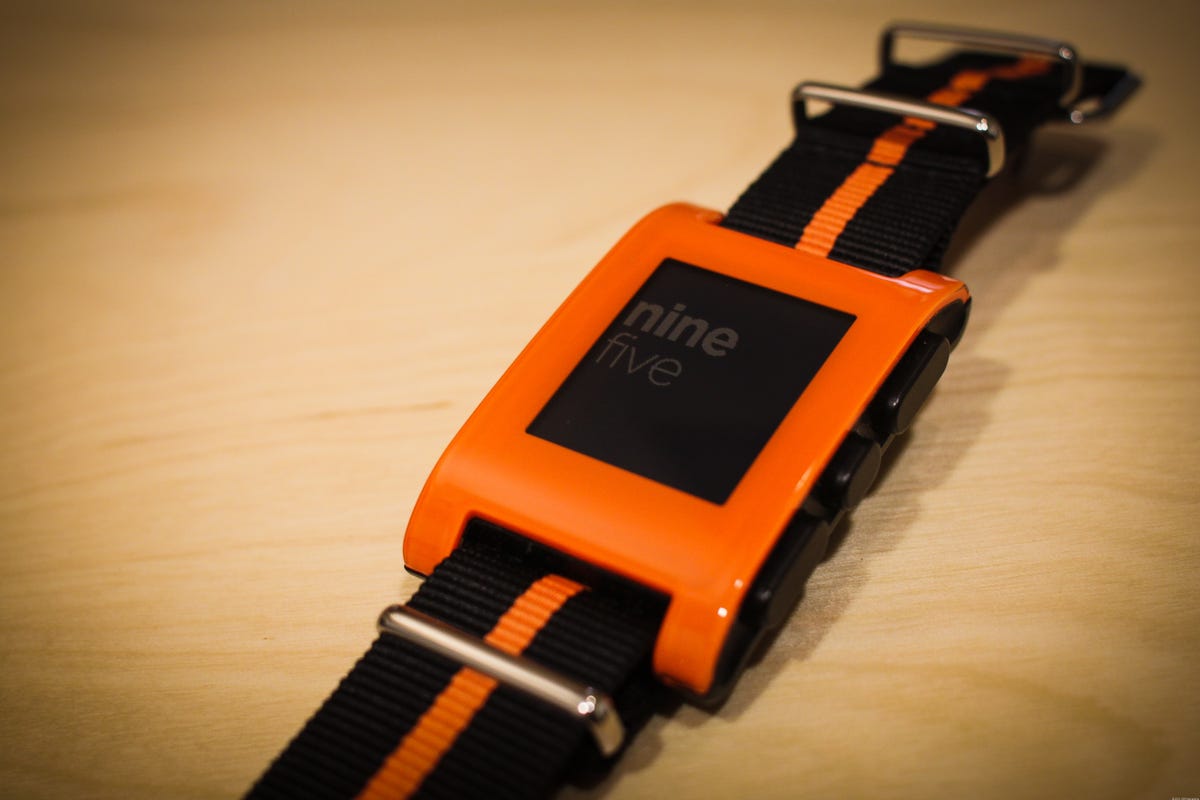Can software make the Pebble smartwatch better?
The patriarch of this generation of smartwatches isn’t getting a face-lift before the end of this year. The black-and-white nontouch display and bare-bones geek charm of the original Pebble will remain. Instead, Pebble will get a bevy of software and app updates, along with a brand-new SDK that promises the types of apps we’d hoped would be on the Pebble when it was first announced.


Scott Stein/CNET
iPhone owners finally get notifications galore
The first big news is for iOS. The Pebble is getting a software update today for iOS 7 that finally allows it to access all application notifications, much like Android phones already allow: your Starbucks app, eBay, weather, or whatever you can imagine will ping the Pebble. Until now, the Pebble only allowed texts, e-mail notifications, and incoming call information on an iPhone.
I tested an early-release build of the new iOS 7-compatible software, and the differences are subtle: any app that shows notifications on an iPhone can display that same notification on the Pebble, you just have to set that app’s notifications to “banner mode” in the settings. The Starbucks app showed my balance when I bought something, and I started getting Facebook comments and Twitter direct messages, too.
The added notifications are welcome and sometimes quite useful, but beware of over-loading: multiple simultaneous notifications can be browsed with side buttons, but after a short while the notifications drop off the Pebble completely, never to be seen again. It’s more of a pager than a notification repository.
New apps: Fitness trackers, offline storage
The Pebble Watch has always had more tech in it than its apps have taken advantage of, in particular, a three-axis accelerometer and Bluetooth LE.
That’s why the newly announced version 2.0 SDK is theoretically exciting: it will finally allow developer access to the Pebble’s built-in tech. Apps will be able to use the accelerometer, log data, store data even when not connected to a phone, and pull data from the phone’s Internet connection on their own. That means possible fitness apps, standalone weather or transit apps, and many of, hopefully, the sort of truly useful apps that the Pebble has lacked.
But the Pebble’s own limitations are unclear: will multitasking be possible? Also, just like before, the Pebble will only store eight apps at a time. How much data one of these apps can store also isn’t exactly clear, but Pebble CEO Eric Migicovsky suggested in a briefing with CNET that a fitness app could, for instance, store up to “days” of data.
The SDK will be made available now, but that doesn’t mean everyone will get new apps right away. Pebble is allowing a few weeks for existing apps to get updated to be compatible with the new SDK. After that, a Pebble software update will be sent to users, along with a first wave of new apps. Some that are already on the way include a Foursquare app for checking in with the touch of a button, a Yelp app showing local attractions, and a GoPro app made by Pebble that acts as a remote for video recording, and to adjust frame rate settings. There’s also a future app in the works made by iControl that will interact as a remote with smart-home technology like locks and lights.
The new Pebble software update also unleashes Bluetooth LE connectivity, which has been latent in Pebbles. Pebble connectivity has been made, previously, via a standard, higher-bandwidth older Bluetooth connection. Smart Bluetooth, which is in the iPhone 4S, 5 and 5S and is becoming standardized through Android phones slowly but surely, is useful for a lot of fitness trackers and devices with background syncing, but according to Migicovsky the Pebble will keep using both forms of Bluetooth at once for the time being.


Lynn La/CNET
Pebble 2? It’s all in the software for now
Cast aside any dreams of a new Pebble, at least for now. In 2013, there is no new Pebble — or, the new software is the new Pebble. That’s not to say there aren’t clear areas for improvement, a lack of a touch screen, for instance, or a microphone, or color display. Instead, Pebble is betting on new apps to reinvent the watch, and make the platform better for existing users. A dedicated fitness tracker and a few clever new apps could be a big difference-maker, especially since the watch is already more comfortable and water-resistant than other wearables. But finding them might still be a challenge: there won’t be an official Pebble App Store or hub, although it’s something that’s being actively pursued. You’ll still have to find third-party app portals or message boards to find what you’re looking for.
It’s clear that the future commitment for Pebble, based on the briefing I had, is on developers, and true cross-platform Android/iOS flexibility, no matter what the app. But how that will translate to a user experience remains to be seen. Stay tuned for a Pebble review update once these new features and apps are available.
The hackable future of the Pebble might be brighter than before, but hopefully it’ll be a little more useful and understandable to the average person, too. More than anything, the Pebble needs its next killer app.


Now playing:
Watch this:
Pebble Watch hands-on: how smart is this smartwatch?
4:09



